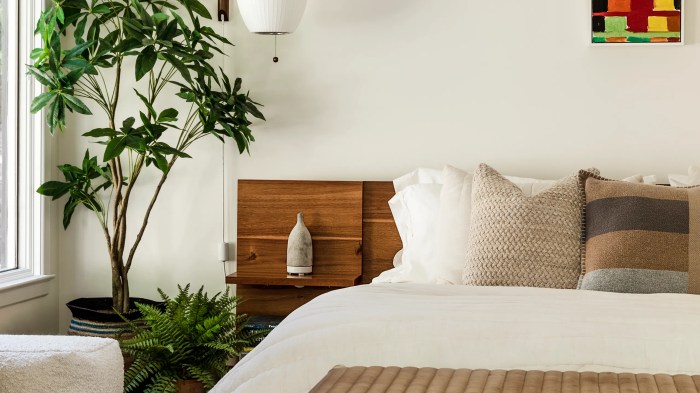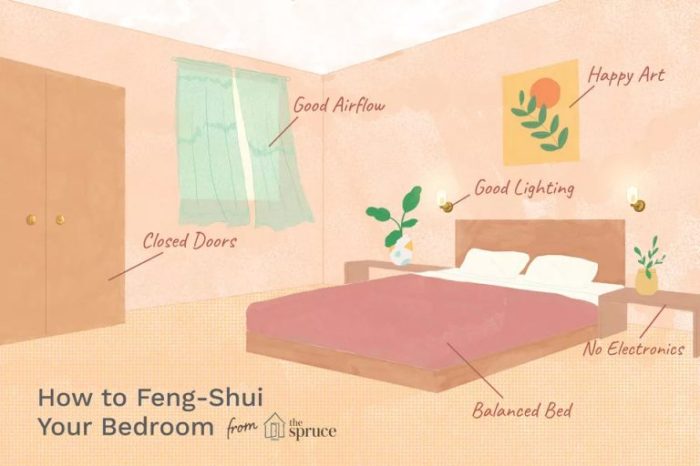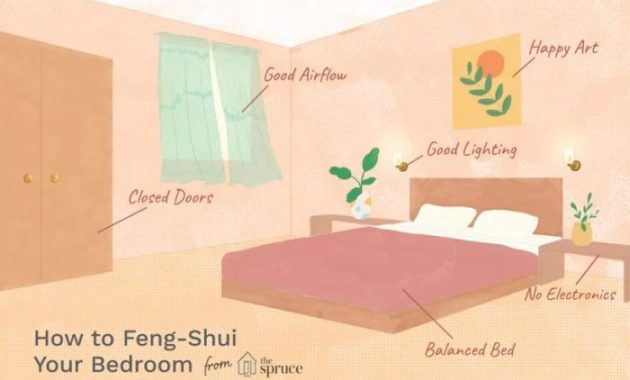Selecting Furniture and Decor According to Feng Shui

Feng shui bedroom design – Transform your bedroom into a sanctuary of peace and tranquility with Feng Shui principles. By carefully selecting furniture and decor, you can cultivate a space that promotes restful sleep, enhances positive energy, and supports your overall well-being. This involves considering material choices, color palettes, and the strategic placement of items within your bedroom.
Suitable Materials and Colors for Bedroom Furniture
The materials and colors of your bedroom furniture significantly impact the energy of your sleeping space. Natural materials like wood, bamboo, and cotton are favored for their grounding and calming properties. Wood, especially, is associated with stability and growth in Feng Shui. Lighter wood tones, such as bamboo or light oak, promote a sense of airiness and serenity, while darker woods, like walnut or cherry, can add a touch of sophistication and warmth, but should be used sparingly to avoid overwhelming the space.
Avoid harsh, synthetic materials like plastic or metal in large quantities, as these can disrupt the flow of positive energy. Similarly, color choices are crucial. Soft, pastel shades like pale blues, greens, and lavenders promote relaxation and tranquility. Earthy tones such as beige and taupe create a sense of calm and stability. Avoid overly bright or jarring colors that can stimulate the mind and interfere with restful sleep.
Harmonious bedroom energy, a cornerstone of feng shui bedroom design, relies on careful placement of furniture and color palettes. To achieve a truly restful space, consider integrating elements of modern bedroom interior design , ensuring clean lines and efficient use of space. This blend of traditional wisdom and contemporary aesthetics strengthens the positive chi flow, vital for a rejuvenating sleep environment according to feng shui principles.
Impact of Different Bed Positions on Sleep Quality and Energy Levels
The placement of your bed directly affects the quality of your sleep and your overall energy levels. Ideally, your bed should be positioned so that you can see the door without being directly in line with it. This allows you to feel safe and secure while still maintaining awareness of your surroundings. Avoid placing your bed directly under a window, as this can lead to a feeling of vulnerability and disrupted sleep.
Positioning your bed against a solid wall, rather than facing a window or door, provides a sense of stability and support. Consider the direction your bed faces; in some cultures, aligning your bed with the cardinal directions is believed to influence energy flow and well-being. For example, sleeping with your head towards the north is believed to be beneficial in some practices.
However, ultimately the best bed position is the one that feels most comfortable and secure to you.
Recommended Feng Shui-Compliant Bedroom Accessories and Their Symbolic Meanings, Feng shui bedroom design
Choosing the right accessories can significantly enhance the positive energy in your bedroom.
The following items are considered beneficial additions to a Feng Shui-compliant bedroom:
- Crystals: Amethyst is known for its calming properties and promotes relaxation. Clear quartz amplifies positive energy. Rose quartz promotes love and compassion.
- Plants: Small, low-maintenance plants like snake plants or peace lilies can purify the air and add a touch of life to the room. Avoid plants with thorns or sharp leaves.
- Artwork: Choose artwork that depicts calming scenes of nature, such as landscapes or seascapes. Avoid artwork that depicts violence, conflict, or negativity.
- Candles: Scented candles with calming scents like lavender or chamomile can promote relaxation and create a peaceful atmosphere. Always ensure candles are used safely.
- Mirrors: Strategically placed mirrors can enhance the feeling of space and light, but avoid placing them directly opposite the bed, as this can disrupt sleep.
Arranging Furniture to Optimize Space and Energy Flow
Proper furniture arrangement is essential for optimizing space and energy flow. Keep the space around your bed clear and uncluttered. Avoid placing large pieces of furniture directly in front of the door, as this can block the flow of energy. Create a sense of balance by arranging furniture symmetrically. For example, you might place bedside tables on either side of the bed.
Avoid overcrowding the room with furniture, as this can create a feeling of constriction and negatively impact energy flow. Leave ample space for easy movement and create a sense of openness and spaciousness. A well-organized and clutter-free space promotes a sense of calm and tranquility.
Addressing Common Feng Shui Bedroom Mistakes

Creating a serene and energizing bedroom sanctuary requires careful attention to Feng Shui principles. Many common mistakes can inadvertently disrupt the positive flow of chi (energy) in your sleeping space, leading to restlessness, poor sleep, and even relationship difficulties. Understanding these pitfalls and implementing simple solutions can dramatically improve your bedroom’s energy and your overall well-being.
Clutter and its Impact on Bedroom Energy
Clutter is a major Feng Shui offender. Accumulated items in the bedroom represent stagnant energy, hindering the free flow of chi. This stagnant energy can manifest as feelings of overwhelm, anxiety, and difficulty sleeping. Clearing clutter creates space for positive energy to circulate, promoting a sense of calm and tranquility. For example, consider a nightstand overflowing with books, magazines, and personal items.
This visual clutter creates a sense of chaos, impacting your ability to relax before sleep. By decluttering and organizing, leaving only essential items, you invite peaceful energy to flow. Consider using drawers, stylish storage boxes, or a minimalist bedside table to keep the space organized and uncluttered.
Improper Placement of the Bed
The placement of your bed is crucial in Feng Shui. Avoid positioning your bed directly in line with the door, as this creates a feeling of vulnerability and can disrupt sleep. Similarly, positioning your bed directly under a window can lead to drafts and a sense of insecurity. Ideally, your bed should be placed against a solid wall, offering a sense of support and security.
A bed placed in the commanding position (diagonal to the door) provides a sense of control and allows you to easily see the entryway without feeling directly exposed.
Negative Energy Sources in the Bedroom
Mirrors, electronics, and sharp corners can introduce negative energy into the bedroom. Mirrors reflecting the bed can disrupt sleep and create restlessness. Electronics emit electromagnetic fields (EMFs) that can interfere with restful sleep. Sharp corners can create “poison arrows” of negative energy, directing negativity towards the bed. To rectify these issues, cover mirrors when sleeping, move electronics away from the bed (or turn them off completely), and use soft furnishings or plants to soften sharp corners.
For instance, a large mirror facing the bed can be covered with a fabric screen or moved to another location.
| Mistake | Impact | Solution | Improved Energy Flow |
|---|---|---|---|
| Cluttered Bedroom | Stagnant energy, anxiety, poor sleep | Declutter regularly, utilize storage solutions | Peaceful, calm, restful atmosphere |
| Bed directly in line with the door | Vulnerability, disrupted sleep, insecurity | Reposition the bed to a commanding position (diagonal to the door) | Sense of security, improved sleep quality |
| Electronics near the bed | Disrupted sleep, restlessness, EMF exposure | Move electronics away from the bed or turn them off before sleep | Relaxing, tranquil, restorative environment |
| Sharp corners pointed at the bed | Negative energy directed towards the sleeper | Soften sharp corners with plants or furniture | Harmonious, protected sleeping space |
FAQ Overview: Feng Shui Bedroom Design
Can I apply Feng Shui principles to a small bedroom?
Absolutely! Feng Shui principles adapt to various spaces. Focus on maximizing space efficiently, using multi-functional furniture, and prioritizing light and air circulation.
What if my bed is against a wall with no space to walk around it?
While ideal placement allows for movement around the bed, it’s not always feasible. Prioritize good ventilation and ensure the head of the bed is against a solid wall for stability and support.
How important is the color of my bedroom walls?
Wall color significantly impacts the energy of the room. Calming colors like soft blues, greens, or neutrals are generally recommended for a restful atmosphere. Avoid overly stimulating or dark colors.
What about electronics in the bedroom?
Minimize electronics, especially those emitting blue light, near the bed. Their electromagnetic fields can disrupt sleep. Consider a designated tech-free zone.

